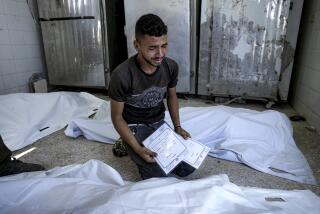Hebron Mosque, Site of Massacre, to Reopen : West Bank: Despite Muslim protests over security measures, worshipers may enter Cave of Patriarchs today.
- Share via
JERUSALEM — Israel’s Cabinet voted unanimously Sunday to reopen the Cave of the Patriarchs in Hebron today despite protests from Muslims, who say new security measures violate the site’s sanctity.
Tension around the site was high Sunday after the Islamic Jihad, a militant Islamic group, called a general strike to protest the planned reopening. The army declared downtown Hebron a closed military area.
What Muslims call the Ibrahimi Mosque has been closed since a Jewish settler opened fire on Muslim worshipers there in February, killing about 30. The settler, Dr. Baruch Goldstein, was bludgeoned to death by Muslims who overpowered him as he fired.
For nine months, the army has labored to install security measures designed to keep Jewish and Muslim worshipers separated inside the shrine. Adherents of both faiths believe the tombs of their shared patriarchs--Abraham, Isaac and Jacob--as well as the tomb of Abraham’s wife, Sarah, rest inside the stone structure.
The site has been a focal point of friction between Arabs and Jews since militant Jewish settlers began moving into Hebron shortly after Israel captured the West Bank from Jordan during the 1967 Middle East War. The settlers insisted that they be allowed to pray in the structure.
Arabs say the shrine served exclusively as a mosque for more than 1,000 years and should revert to that in order to avoid further friction between the two communities. Before the February massacre, Jews and Muslims were separated only by movable partitions inside the structure. Settlers were routinely allowed to carry their weapons into the site. Now, the partitions are permanent and signs outside the tomb warn that weapons are forbidden.
Palestine Liberation Organization Chairman Yasser Arafat issued a statement Sunday saying that restructuring the building violated the Israeli-PLO peace treaty.
“We consider the Ibrahimi Mosque a holy place for Muslims, and we do not accept division or separation,” he said. “We see this separation as a provocation that will lead to increasing tension between Muslims and Jews.”
For their part, Jewish settlers complain that the army’s security measures grant too much prayer space to Muslims and not enough to Jews. Under the new plan, Jews will not be allowed to pray in Yitzhak Hall--where the massacre occurred. Neither Arabs nor Jews will be allowed to enter the site at night, a measure that will prevent adherents of both faiths from saying their evening prayers there.
The measures the army has taken “are totally against the Jews and for the Arabs,” said Noam Arnon, a spokesman for the settlers. Arnon said that Jews are left with only a tiny part of the site to use for their prayers.
“Of course, we cannot reach a solution which will satisfy everyone, but . . . I think we have reached the best possible arrangements,” Deputy Defense Minister Mordechai Gur told Israel Army radio Sunday.
In addition to surveillance cameras, the army has trained a special unit to guard the site. It has installed gates on the roads leading to the site and metal detectors at the entrances. There are separate entrances for Muslims and Jews, as well as separate drinking fountains and restrooms.
Military sources said Sunday that the army is braced for disturbances today. Initially, the army intends to limit worshipers to 300 from each faith.
“It does not look like a mosque--it looks like a fortress,” Hebron Mayor Mustafa Natshe said after touring the site with the Israeli military governor Sunday. Natshe said he believes the army should first take measures to ease tensions in Hebron before reopening the mosque.
More to Read
Sign up for Essential California
The most important California stories and recommendations in your inbox every morning.
You may occasionally receive promotional content from the Los Angeles Times.













